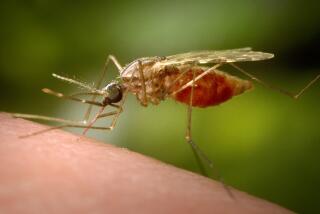AIDS Study Extended After Vaccine Brings No Response
- Share via
The failure of an experimental AIDS vaccine to trigger an immune response in 60 volunteers has forced U.S. government researchers to extend the already delayed study, recruit additional volunteers and double the maximum dose.
The vaccine, which was the first to be approved for human testing in this country, has so far produced no response at the top dose tried--a dose at which the same preparation had induced a strong immune response in chimpanzees.
As a result, the researchers at the National Institutes of Health have altered their plans in the 7-month-old study and begun recruiting 15 new subjects. Though they had expected to see a response in the original study group by now, researchers said the absence of signs of immunity does not call into question the approach being used.
“I think we’re just not getting a dose that’s adequate in humans to induce an immune response,” said Dr. Joseph A. Kovacs, the senior NIH investigator on the vaccine trial. “ . . . You can’t extrapolate directly from animals to humans.”
French Research
News of the finding comes less than a week after a French scientist announced that he had developed immunity against the virus after injecting himself repeatedly with a different vaccine. His immune state is believed to be the first in a human.
Researchers have disagreed over what is the best approach to an AIDS vaccine, a preparation that would protect healthy people from the disease. If successful, a vaccine would work by stimulating the immune system to produce protective antibodies and white blood cells.
The French researcher, Dr. Daniel Zagury, is working with a live-virus vaccine made with recombinant DNA technology. A gene that produces a key AIDS virus protein is inserted into the vaccinia, or cowpox, virus, which is used to immunize humans against smallpox.
The vaccine being used at NIH in Bethesda, Md., does not involve injection of a live virus. Rather, the gene for the protein coat that surrounds the AIDS virus is combined with an insect virus to produce large amounts of the protein. The purified protein is then injected into the muscle.
“We’re not going to have a vaccine soon. That’s very clear,” Dr. June Osborn, a specialist in virology and infectious diseases at the University of Michigan, observed Monday. She called the current state of vaccine research “not a very happy scene at this point.”
In the NIH trial, 60 healthy volunteers have received injections of the experimental vaccine in doses of either 10, 20, 40 or 80 micrograms. Half of the subjects in each group received a single injection, and the other half in addition received booster shots of the same dosage. So far, none of the volunteers has shown any immune response in tests that detect antibodies to the AIDS virus, Kovacs said.
As a result, he said his team met with the drug company that created the vaccine, MicroGeneSys of West Haven, Conn., and agreed in recent weeks to amend the original plan for the trial. They will now recruit 15 more volunteers to receive 160 micrograms.
That dose will be double the dose that produced an immune response in chimpanzees in earlier animal trials. Kovacs said the researchers had anticipated a response in humans at 80 micrograms; but he said they were not surprised that none has occurred.
“I think it just highlights that the study was designed as a safety as well as immunogenicity study,” Kovacs said. “We started at a low dose intentionally to make sure that it appeared to be safe. That was the primary concern.”
Several observers said Monday that they were not surprised by the development in the NIH trial.
Dr. Alexandra Levine, a professor of medicine at USC, said experience with AIDS research has indicated that it is very difficult to extrapolate findings in laboratory and animal tests to humans.
“When you’re starting with a new substance that has never been given to man before, it’s very difficult to translate from the test tube to the biological creature as far as dosing,” she said. “ . . . You may not be able to translate from the chimpanzee to man.”
The current study is simply the first phase of human testing, aimed at testing the safety and dose range of the vaccine. If the first phase proves successful, expanded studies will examine the vaccine’s effectiveness and any adverse reactions.
Only one other experimental vaccine is being tested in federally approved human trials in the United States.






